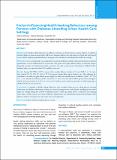Please use this identifier to cite or link to this item:
https://hdl.handle.net/20.500.14356/889Full metadata record
| DC Field | Value | Language |
|---|---|---|
| dc.contributor.author | Silvanus, Vinutha | - |
| dc.contributor.author | Maharjan, Srijana | - |
| dc.contributor.author | Jha, Anushree | - |
| dc.date.accessioned | 2023-04-03T08:35:19Z | - |
| dc.date.available | 2023-04-03T08:35:19Z | - |
| dc.date.issued | 2022 | - |
| dc.identifier.citation | SilvanusV., MaharjanS., & JhaA. (2022). Factors Influencing Health Seeking Behaviour among Persons with Diabetes Attending Urban Health Care Settings. Journal of Nepal Health Research Council, 20(02), 347-353. https://doi.org/10.33314/jnhrc.v20i02.3934 | en_US |
| dc.identifier.issn | Print ISSN: 1727-5482; Online ISSN: 1999-6217 | - |
| dc.identifier.uri | http://103.69.126.140:8080/handle/20.500.14356/889 | - |
| dc.description | Original Article | en_US |
| dc.description.abstract | Abstract Background: Health seeking behaviour can influence outcomes in chronic diseases such as diabetes. As diabetes burden is higher in urban areas and under half receive adequate diabetes care and support in Nepal, this study aimed to assess factors influencing health behaviour among persons with diabetes attending urban health care settings. Methods: A cross-sectional study was conducted at two private healthcare settings with a pretested semi-structured questionnaire to assess health behaviour in particular with gender and regular diabetes follow-up. Bivariate analysis alongwith univariate and multivariate logistic regression was used to assess factors that influence HSB (P<0.05). Adjusted odds were reported within 95% confidence intervals. Results: Among 385 PWDs (42.3% women) with a median diabetes duration of 7 years (IQR: 3 to 14 years), three fourths (75.1%, 95% CL: 70.5 to 79.1%) reported regular follow-up for diabetes care. After adjusting for confounders, the odds of regular follow-up were higher for those with a family history of diabetes (AOR: 1.82, 95% CI: 1.11 to 3.00) and non-smokers (AOR: 2.08, 95% CI: 1.34 to 3.61). The odds of follow-up were lower among the elderly (? 60 years) (AOR: 0.59, 95% CI: 0.35 to 0.97) and those with a family income below 35,000 Nepali rupees (AOR:0.39, 95% CI: 0.23 to 0.67). Conclusions: A plurality of health seeking behaviours such as regular follow-up care, taking glucose lowering medications and diabetes information seeking was observed among persons with diabetes attending private urban heath care settings during the COVID-19 pandemic period. Older age, family history of diabetes, non-smoking status and low family income were found to influence regular follow-up. In particular, psychosocial mechanisms that influence behavior among persons who smoke may need exploration. Keywords: Diabetes Mellitus; health behaviour; Nepal | en_US |
| dc.language.iso | en | en_US |
| dc.publisher | Nepal Health Research Council | en_US |
| dc.relation.ispartofseries | April-June, 2022;3934 | - |
| dc.subject | Diabetes Mellitus | en_US |
| dc.subject | Health behaviour | en_US |
| dc.subject | Nepal | en_US |
| dc.title | Factors Influencing Health Seeking Behaviour among Persons with Diabetes Attending Urban Health Care Settings | en_US |
| dc.type | Journal Article | en_US |
| Appears in Collections: | Vol 20 No 02 Issue 55 April-June, 2022 | |
Files in This Item:
| File | Description | Size | Format | |
|---|---|---|---|---|
| 3934-Manuscript-29678-2-10-20221103.pdf | Full Article. | 302.98 kB | Adobe PDF |  View/Open |
Items in DSpace are protected by copyright, with all rights reserved, unless otherwise indicated.
